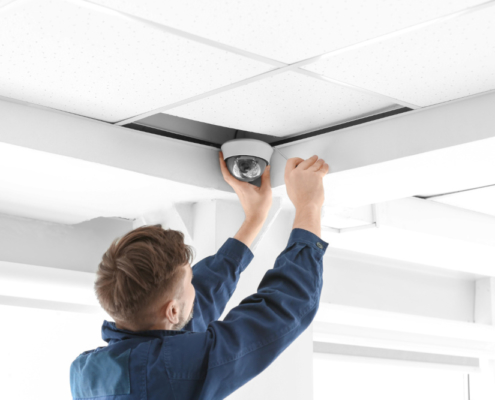CCTV Installers
CCTV systems have many benefits including: improved security and surveillance of your premises. Our CCTV Installers at EIS are here to provide you with a full CCTV solution. From planning, design , installation, and aftercare. Having security camera’s is a proven and effective way to decrease crime on your premises. The presence of camera’s will make criminals think twice before acting. Should they proceed with criminal activities, the camera footage will give the police the upper hand during investigations. Furthermore, having CCTV camera’s is only effective if the system is installed by a knowledgeable individual. Factors such as, Camera position, wired, wireless, night vision, DVR or NVR all play a part in having an effective system.
EIS CCTV installers have a vast amount of experience. Our installers have worked in all types of commercial premises. Whether you have a small retail shop or a large campus, we can assure you the cameras we install will cover all areas of concern, with no blind spots.
CCTV Solutions
As your CCTV Installers, EIS can install cameras for your home and business below is a list of CCTV services.
- Camera position
- Cabling for CCTV
- Thermal Image Camera
- Facewatch Installation
- Guidance on how to use your new system
- Relocation (de-installation, de-lapse)
- Advice on which camera to use
- Suitable solution for your budget
Overall, there’s a variety of CCTV solutions available depending on your security needs. For example, DRV systems and NVR systems both offer reliable recording and storage of footage, but which should you choose? Our knowledgeable team will guide you through these technical decisions.
While CCTV systems provide additional benefits such as improved surveillance, employee monitoring, and deterrence of potential criminals. It is important to select the right system for your premises and hire a qualified installer in order to ensure maximum protection.
Understanding CCTV Cameras
A CCTV camera, also known as a closed-circuit television camera, is a surveillance camera that transmits video and audio to a specific place. It is usually placed in an area where it can observe activity or monitor events. The signal from the camera is monitored and recorded for security purposes, allowing security personnel to view what is happening in the monitored area. CCTV cameras can also be used to monitor traffic, prevent crime, and deter vandalism. They are often installed in places such as banks, airports, malls, office complexes and other public areas.
CCTV cameras are often used together with other security measures such as alarms and motion sensors. This helps provide a more complete security system that can protect people and property. CCTV cameras can be used for a variety of purposes, from monitoring employees in the workplace to providing evidence in criminal cases. They are also commonly used as part of home security systems, allowing homeowners to keep an eye on what is happening inside their house.
CCTV Installers – Options
Wired CCTV
Wired CCTV cameras use a cable to transmit video and audio signals from the camera to a monitor or recording device. This type of system is often used in commercial settings where security personnel need continuous coverage of an area.
The cables connect the camera to a power source, allowing it to record continuously, even when there is no light available. The signals sent from the camera can be viewed and recorded in real-time on a monitor or digital recorder. The footage is also usually stored digitally, allowing it to be recalled and analysed at any time.
Wired CCTV systems are often more reliable than wireless systems, as they don’t require power or data networks to work. However, they require more installation and maintenance, as the cables need to be run through walls or ceilings. They are also more expensive than wireless systems.
Wireless CCTV
Wireless CCTV cameras use radio waves to transmit video and audio signals from the camera to a monitor or recording device. This type of system is often used in residential settings, as it requires less installation than wired systems. The camera sends the signal directly to a base station, which converts it into digital data. This data is then sent to a display device, allowing the user to view and record the footage.
Wireless CCTV systems are often more flexible than wired systems, as the cameras can be placed almost anywhere without needing additional cabling. They are also generally more affordable than wired systems. However, they require a reliable data network in order to work correctly, and the signal can be interfered by other wireless devices. Furthermore, they also require more power than wired systems, as they need to be powered by a battery or an electrical outlet.
CCTV Installers – NVR or DVR?
NVR (Network Video Recorder) systems are digital surveillance systems which use a network of computers and cameras to record and monitor video footage. NVRs are connected directly to an IP camera or other recording device, allowing them to access the data they need without relying on an analogue connection like a coaxial cable. They also offer remote access, meaning you can monitor and manage your surveillance footage from anywhere with a secure internet connection.
DVR systems are (Digital Video Recorders) that use coaxial cables to connect their cameras to a recording device. They offer more limited remote access than an NVR system and have shorter storage times, so they can’t store as much footage for long periods of time. DVRs are also typically less reliable than NVR systems due to the need for coaxial cables which can be prone to interference or damage. They are also more difficult to install and manage than an NVR system.
NVR systems are generally considered more reliable than DVRs (Digital Video Recorders) as they provide higher resolution images, longer recording storage times and multiple viewing options.
NVR or DVR Continued….
In short, an NVR system is typically seen as a more reliable, modern surveillance option than a DVR system due to its increased storage capacity, remote access capabilities, and easier installation process. It is important to note that both types of systems have their own advantages and disadvantages. As a result, it’s best to consider your individual needs before making a decision on which one to install.
It should be noted that while NVR systems may offer improved features compared to DVRs, they also come with a higher price tag. Ultimately, the right system will depend on your budget and surveillance needs. It’s important to weigh all of your options carefully before making a decision. Additionally, if you find that the system you choose doesn’t meet all of your requirements, it can always be upgraded or replaced in the future.
Regardless of which type of system you choose, implementing a reliable and robust surveillance solution is essential for any business. It offers a range of benefits including increased security, improved employee productivity, and better customer service. Furthermore, investing in the right surveillance system can be a great way to ensure you’re getting the most out of your security investment.
CCTV Installers Conclusion
The EIS CCTV installers are experienced professionals who can provide quality, reliable installation and maintenance services for your CCTV systems. Whether you’re in need of a simple upgrade or completely new system, our team has the skills to ensure that you get the most out of your security cameras. We employ only highly trained and qualified personnel who understand the latest technologies and procedures to ensure that your system is installed and maintained properly. Our technicians are more than happy to help you make the right decision for your security needs, so contact us today if you’re interested in having CCTV installers from EIS take care of your installation or maintenance needs.






Share this entry